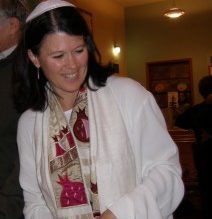Parashat Toldot tells a story of three wells dug by Isaac. Abraham Avinu has just died, and Isaac, not yet “Avinu,” seems to struggle to find his own way in the world. He is summoned, but the path is not clear. Isaac sets about re-digging his father’s old wells. Is he searching for something of his father’s certainty? Is he trying to connect with him, with his past, with a time before it all depended on him?
Digging is what we do when what we seek is not at hand. In the pantry, in the closet, in the archeological site, we are looking for something. On the surface, one digs a well in order to find water. But water, according to our tradition, is not just that which keeps human beings physically alive; it is also what keeps Jews spiritually alive: it is Torah. At a deeper level, as Isaac looks for water, he seeks his own understanding – his own Torah. The living Torah that will sustain him comes through that of his father. He must understand his inheritance before he can build the Promised future upon it.
The process is discouraging. Isaac does not yet know what he needs to learn, and so the waters of the first well will not answer his need, nor the second. Each effort brings him more difficulties: the first well is called Esek, “contention”, and the second Sitnah, “hatred”. Things are going from bad to worse. But he does not give up. Isaac keeps digging.
וַיַּעְתֵּק מִשָּׁם וַיַּחְפֹּר בְּאֵר אַחֶרֶת וְלֹא רָבוּ עָלֶיהָ; וַיִּקְרָא שְׁמָהּ רְחֹבוֹת וַיֹּאמֶר כִּי-עַתָּה הִרְחִיב ה’ לָנוּ וּפָרִינוּ בָאָרֶץ
He moved yet again, and dug another well, and there was no fighting over it. [Isaac] called it by the name Rehovot, which is to say: ‘Now ‘ה has made room for us, and we shall be fruitful in the land.’ (Bereshit 26:22)
Rehovot – the name is a breath of thanksgiving. No more fighting, no more hatred. Enough room for Isaac’s entire encampment to pitch tents, graze goats, and even plant crops. Room that brings about deep breaths, and great, millennial joy: בשוב ה את שיבת ציון היינו כחולמים – When Hashem restores the fortunes of Zion, we will be like dreamers, our mouths filled with laughter and our tongues with joyful song. (Psalm 126) The name Rehovot speaks of the Land of Israel as we dream of it: a land with room for all. A land, in the words of its Declaration of Independence, of “complete equality of social and political rights for all its inhabitants irrespective of religion, race or sex; it will guarantee freedom of religion, conscience, language, education and culture.”
Early pioneers in Eretz Yisrael were delighted, in the founding days of the Yishuv, to give towns and villages joyful Biblical names, among them Rehovot. The practice connected us to our ancestors, and expressed our link to those ancient times. But as Ari Shavit described in his My Promised Land: The Triumph and Tragedy of Israel, when we were coming home, we were not able to see that there were others already using the old wells we sought to re-dig.
To give a name is not to create a reality. To inherit is not to own. To be promised is not to deserve. And because we are not yet clear on what Torah we must learn in our own time, contention, and, yes, hatred, well up from the beloved Land of Promise. Jewish vigilantism, threats of population transfer, and growing institutionalized discrimination will never bring about Rehovot. This is poisonous water; this is not life-giving Torah.
Twenty years ago last week, Yitzhak Rabin ז״ל died still digging for the well of Rehovot. And the light of so many others has dimmed to cynicism and hopelessness. On Shabbat Toldot, “generations”, clinging to the resolute hope that we may yet drink from the well of Rehovot is all that will keep us from discouragement. In these dark days when the work is fraught, painful, and invites despair, follow the lead of Isaac Avinu.
Keep digging.
Offered in memory of Richard Lakin, זכרונו לברכה
Rabbi Ariel Stone has been the spiritual guide of Shir TIkvah in Portland, OR since the congregation’s founding in 2001. Her study of the sefirot and their meaning for modern life is Because All Is One. She shares parashat hashavua commentary at Torah for the 21st Century.

